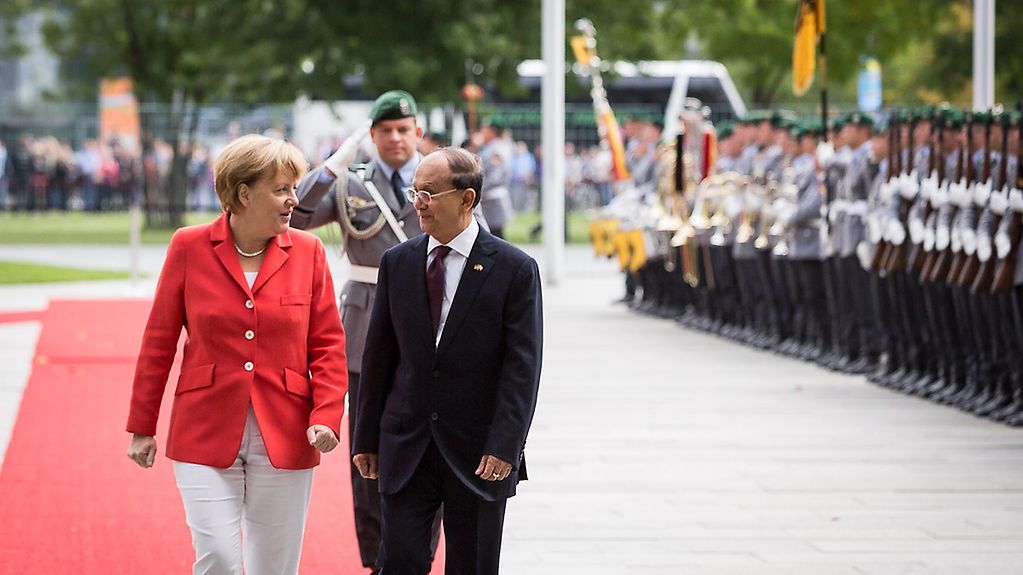President Thein Sein in Berlin
Talks between the Chancellor and Myanmar’s President focused on bilateral relations. Closer economic cooperation would require security for investors said Angela Merkel. She assured the President of German support for the country’s process of democratisation.
3 min reading time

The Chancellor welcomes Myanmar's President Thein Sein with military honours
Photo: Bundesregierung/Kugler
Chancellor Angela Merkel received the President of the Republic of the Union of Myanmar, Thein Sein, at the Federal Chancellery. Over lunch their discussions focused on extending bilateral relations.
Myanmar’s President Thein Sein is on an official state visit to Germany until 4 September. He will also be meeting Federal President Joachim Gauck, the Governing Mayor of Berlin Klaus Wowereit and representatives of the business community.
Supporting the democratisation process
"We have discussed in detail the process of democratisation. Germany would like to support Myanmar in this," declared the Chancellor. "Significant progress has been made in the field of freedom of the press."
The forthcoming elections were also on the agenda.
During her visit to Berlin in April, the Nobel Peace Laureate and leader of Myanmar’s opposition Aung San Suu Kyi also met with the Chancellor. In November 2010 Aung San Suu Kyi was released by Myanmar’s military leaders from a total of 15 years of house arrest.
Thein Sein said that the young democracy in Myanmar has not seen any bloodshed in its three years of existence. Continued positive economic development is needed to further support the process of democratisation.
Security for investment
Myanmar is still a very poor country, but "Germany would like to help this country to develop positively," said Angela Merkel. To this end the two leaders discussed "various forms of cooperation".
"It is reasonable and important that the European Union get an agreement on investment security," stressed the Chancellor. For German businesses investment security is also a top priority.
Reforms underway
The President of Myanmar expressed his thanks for German support to date. He also suggested that incentives be put in place to raise investment in Myanmar. German investment was needed, he said, primarily in the fields of education and private sector development (especially agriculture and tourism) alongside development cooperation. Joint ventures must be established that give the country economic prospects.
Myanmar is willing to put in place the necessary preconditions, said Thein Sein. Work has already begun on reforming pertinent legislation and the education system is currently undergoing a radical reform.
Minorities in Myanmar
In a statement to the press Angela Merkel stressed the importance of integrating the various minorities in Myanmar. Positive economic development presupposes a peaceful situation within the country. This means that policies based on reconciliation and tolerance are of elementary importance for Myanmar.
The visit of the the President of Myanmar, precisely 60 years after diplomatic relations were established, was a positive symbol noted the Chancellor. Foundations have been laid on which bilateral relations can develop further in a positive direction.
The Federal Republic of Germany and the Union Myanmar (or Burma as the country was then known) have maintained diplomatic relations since 1954. Currently, relations between Germany and the European Union on the one hand and Myanmar on the other are shaped by the EU’s common stance on Myanmar. This includes the EU’s efforts to foster democracy and human rights in Myanmar and the implementation of humanitarian projects with local partners in Myanmar.